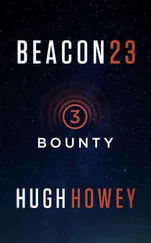Tracy thought of grabbing something as well. A twig. A piece of that bark. A single falling snowflake on her tongue. She scanned the woods for some sight of John as Anatoly guided her inside, deep enough that the founders by the doors could shove the behemoths closed. Four feet thick, solid steel, streaked with rust where the weather had wetted them, they made a hideous screech as they were moved. A cry like a mother wolf out in the gray woods calling for her pups.
The white world slimmed as the doors came together. The view became a column, and then a gap, and then a sliver. There was a heavy and mortal thump as the doors met, steel pressing on steel, and then a darkness bloomed that had to be blinked against to get eyes working again.
Though the doors were now closed, Tracy thought she could still hear the sound of the wolf crying—and realized it was one of the founders making that mournful noise. Tears welled up in her eyes, brought there by a partner’s lament. And Tracy remembered being young once and sobbing like that. She remembered the first time a man had broken her heart. It had felt like the end of the entire fucking world.
This day was something like that.
The mountain was full of the confused. Nearly five thousand people asking questions. Their bags were not yet unpacked; their backs were still sore from the rutted, bumpy ride in the buses. And now the myriad excuses for bringing them there—the retreats, reunions, vacations, emergencies—evaporated as conflicting accounts collided.
With the doors closed, the founders set out to explain. First to family. Later, to all of the invited. Tracy had been given an equal allotment of invitations, and she had used most of them on practical people. Soldiers. Tools of retribution. When the world was clean, all she wanted was to see a bullet in the people who had done this.
Of friends, she had none. Most of her adult life had been spent in Washington or overseas. There was a doorman in Geneva who had always been kind to her. There was the guy who did her taxes. Which was to admit that there was no one. Just her meager family: her father, her sister, and her sister’s husband. Three people in all the world. Maybe that was why John’s decision hurt so much. He was almost all she had. All she’d thought she had.
At least it meant a small audience as she dispensed the horrid truth, the nightmare she’d held inside for more than a year. Tracy hesitated outside the door to her sister’s small room. She raised her fist and prepared to knock. Truth waited for her on the other side, and she wasn’t sure she was ready.
Her father sat on the bed and wrung his hands while Tracy spoke. Her sister, April, sat next to him, a look of slack confusion on her face. Remy, April’s husband, had refused to sit. He stood by his wife, a hand on her shoulder, something between anger and horror in his eyes.
They were all dressed for the camping trip they’d been promised—a week of backpacking, of living in the woods. The gear by the foot of the bed would never be used. The bags and the garb were reminders of Tracy’s lies. She listened as the words spilled from her mouth. She listened to herself say what she had rehearsed a hundred times: how the tiny machines used in hospitals to attack cancer—those invisible healers, the same ones that would’ve saved Mom if they’d been available in time—how those same machines were as capable of killing as they were of healing.
She told her family how those machines were in everyone’s blood, in every human being’s on Earth. And curing everyone might be possible, but it would only be temporary. Once people knew that it could be done, it was only a matter of time. A switch had been invented that could wipe out every man and woman alive. Any hacker in his basement could flip that switch—which meant someone would.
Tracy got through that part without the wailing or hysterics she’d expected, without the questions and confusion from her dad, without anyone pushing past her and banging on the door, screaming to be let out. No one asked her if she belonged to a cult or if she was on drugs or suggested she needed to take a break from whatever work she did in Washington, that she needed to see a professional.
“It was only a matter of time before someone did it,” Tracy said again. “And so our government acted before someone else could. So they could control the aftermath.”
Remy started to say something, but Tracy continued before he could: “We aren’t a part of the group who did this,” she said. She looked to her father. “We didn’t do this. But we found out about it, and we realized we couldn’t stop it. We realized… that maybe they were right. That it needed to be done. And so we did the next best thing. We created this place. We invited ourselves along. And those that we could. We’ll be okay here. You all were inoculated on the way. You probably felt your ears popping on the bus ride up. Now we’ll spend six months here, maybe a year—”
“Six months,” Remy said.
“This can’t be real.” Her sister shook her head.
“It’s real,” Tracy told April. “I’m sorry. I never wanted to keep this from any of—”
“I don’t believe it,” Remy said. He glanced around the room as if seeing it for the first time. April’s husband was an accountant, was used to columns of numbers in black and white. He was also a survivalist, was used to sorting out the truth on his own. He didn’t learn simply by being told. Igor had warned that it would take some people weeks before they believed.
“We are positive,” Tracy said. This was a lie; she had her own doubts. She wouldn’t be completely sure until the countdown clock hit zero. But there was no use infecting others with her slender hopes. “I realize this is hard to hear. It’s hard even for me to grasp. But the war we were bracing for isn’t going to come with clouds of fire and armies marching. It’s going to be swifter and far worse than that.”
“Did you do this?” her father asked, voice shaking with age. Even with his encroaching, occasional senility, he knew that Tracy worked for bad agencies full of bad people. There were classified things she had confided to him years ago that he had been willing to shoulder for her. They would likely be the very last things his dementia claimed, little islands of disappointment left in a dark and stormy sea.
“No, Dad, I didn’t do this. But I am the reason we have this place, a nice place to be together and wait it out.”
She flashed back to that night in Milan, to the first time she’d laid eyes on the book with the word Order embossed on its cover. It was the same night she made John forget about his wife for a brief moment, the night when all those years of flirtations came to fruition: the bottle of wine, the dancing, that dress—the one she’d gotten in trouble for expensing to her company card. And in his room, after they made love, and hungering for more danger, she had gone to the dresser where she knew his gun would be tucked away, and she’d found that book instead.
If John had stayed in bed, she wouldn’t have thought anything more of it. The book was full of the dry text that only lawyers who had become politicians could craft. Emergency procedures. An ops manual of some sort. But the way John had lurched out of bed, it was as if Tracy had let his wife into the room. She remembered the way his hands trembled against her as he asked her to put it away, to come back to bed, like she’d grabbed something far more dangerous than a gun, something cocked and loaded with something much worse than bullets.
After he’d gone to sleep, Tracy had sat on the edge of the bathtub, the book open on the toilet lid, and had turned every page with her phone set to record. Even as she scanned, she saw enough to be afraid.
Читать дальше












